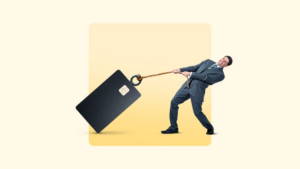Recession-proof your finances by paying off credit card debt

Citi is an advertising partner.
Credit card debt is never a good thing. If you find yourself owing hundreds or even thousands of dollars, a recession could make paying it off exponentially harder, depending on your circumstances.
Economists in Bankrate’s Second-Quarter Economic Indicator survey put the chances of a recession in the next year at 35 percent, and roughly 40 percent of those surveyed expect inflation to stay above the Federal Reserve’s 2 percent target through the end of 2027. Additionally, economists in Bankrate’s survey see monthly job growth averaging just 81,000 positions over the next 12 months, while unemployment is predicted to rise to 4.6 percent by June 2026.
Regardless of what happens, it’s always a good idea to be prepared for a sharp downturn in your financial circumstances. Paying down credit card debt is among the best ways to prepare for a recession, and it can make you far more financially resilient.
Start paying off credit card debt
Paying down your debt is especially important during times of uncertainty, says Kate Dorman, a licensed independent clinical social worker and Certified Financial Therapist at Sound Financial Therapy. “As the risk of a recession increases, reducing credit card debt can ease financial stress and boost feelings of financial safety and stability, improving your overall mental health and well-being,” she says.
According to Dorman, there are steps cardholders can start taking now. “[They] can start by contacting their bank to negotiate a temporary reduced interest rate, so a greater portion of each monthly payment can go toward the principal,” she says.
Next, Dorman recommends reviewing your largest expenses — typically housing, transportation and food. “These are the categories where you have the greatest opportunity to reduce costs. Canceling your Spotify subscription could save you, at most, $250 a year.”
Whereas bigger lifestyle changes, such as living with roommates, becoming a one-car household and dining or ordering out less frequently, can save you thousands of dollars annually. If you are prone to impulse spending, slow down.
— Kate Dorman Certified Financial Therapist
Use apps for financial planning
Debt payoff planning can be stressful and even confusing, but there are personal finance apps that can help make it easier. For example, you can use Bankrate’s Credit Card Payoff Calculator to understand the impact of different payment amounts on your total debt and debt payoff time.
The following apps can also help your payoff journey:
Choose your payoff method
If you want to go it alone, there are several effective ways to pay off credit card debt, but the two primary techniques are the avalanche method and the debt snowball strategy referenced earlier. Each method is based on a different theory — and the method you choose should be the one that is most likely to motivate you.
Debt snowball strategy
The debt snowball strategy involves paying off your smallest debt first, then working your way up to the largest. Each time you pay off an individual debt, you reallocate the money you were spending on that bill to pay off the next-smallest debt. The idea is to start with the quick win — the low-hanging fruit — and build momentum until you have it down to one big payoff.
Avalanche method
The avalanche method is based more on economic efficiency: making your money go as far as possible. With the avalanche method, you focus first on paying off the debt with the highest interest, then work your way down to the debt with the lowest interest. The less you pay in interest, this theory goes, the more you can put toward repayment of principal.
Other options available to cardholders include a debt consolidation loan, debt renegotiation and working with a credit counselor.
Consider a balance transfer credit card
You may be reluctant to consider credit cards as a solution to your credit card debt problem, considering you’ve accumulated debt on one in the first place. However, balance transfer credit cards can be an excellent financial tool to pay down credit card debt for those who qualify. Their long zero-interest periods can help you save a significant amount of money on interest and fees, giving you a head start on tackling your principal debt — or even paying it off completely.
Maximize your interest-free payoff timeline
The Citi Simplicity® Card offers one of the longest interest-free periods available with a 21-month, 0 percent intro APR on balance transfers made within four months of account opening, after which the regular interest rate rises to 17.49% - 28.24% (Variable).
The card also offers a 0 percent intro APR for 12 months on purchases, followed by the same variable APR. Besides this, the card has a “no-late-fees” policy, meaning you won’t be charged a fee or even a penalty APR rate for making a late payment (though it’s important to note you may still lose your intro APR offer or damage your credit score if you pay behind schedule). The icing on top is the card’s lack of an annual fee.
One notable drawback of the Citi Simplicity is its starting balance transfer fee of 3 percent (or $5, whichever is greater) within the first four months of account opening (after which it rises to 5 percent or $5, whichever is higher). You also won’t earn any rewards or welcome bonus with this card, but that’s the price you pay for an exceptionally long intro APR offer.
When evaluating balance transfer cards, be sure to include the balance transfer fee in your calculations — along with the amount you’ll be saving on interest payments throughout the zero-interest period — to determine the best option for you. Finally, don’t transfer existing balances to a new balance transfer credit card unless you know you can pay them off before the 0 percent intro APR runs out. Otherwise, you could find yourself even more stuck in a cycle of credit card debt.
Get long-term value from your card
If you’re interested in earning rewards while paying off debt, the Chase Freedom Unlimited® offers a 15-month 0 percent intro APR on purchases and balance transfers (along with a balance transfer fee of 3 percent or $5, whichever is greater, in the first 60 days; 18.24% - 27.74% Variable after). After 60 days, that fee rises to 5 percent.
The Freedom Unlimited earns you 1.5 percent cash back on all purchases, making it a great card for everyday spending. You also get:
- Enjoy 5% cash back on travel purchased through Chase Travel℠, our premier rewards program that lets you redeem rewards for cash back, travel, gift cards and more.
- 3% cash back on drugstore purchases and dining at restaurants, including takeout and eligible delivery service.
- 1.5% cash back on all other purchases.
On top of all this, you won’t pay an annual fee, and there’s a first-year welcome bonus:
- Earn a $200 Bonus after you spend $500 on purchases in your first 3 months from account opening
Just be careful to only spend what you can afford to comfortably pay off each month, or hold off on any new spending completely until you’ve paid off your credit card debt.
For help choosing the right balance transfer card based on your ideal payoff window, use Bankrate’s credit card balance transfer calculator. Simply enter your current credit card balances and interest rates and compare them with any potential new card details and fees.
The bottom line
No matter how you decide to move forward, be sure to prioritize building your emergency savings during the process of paying off your credit card debt.
If you don’t have an emergency fund yet, start one now to better protect yourself from the potential effects of a recession. Then, after your debt is paid off, revise your budget to keep from going into credit card debt in the future.
*The information about the Citi Simplicity® Card has been collected independently by Bankrate.com. The card details have not been reviewed or approved by the card issuer.Why we ask for feedback Your feedback helps us improve our content and services. It takes less than a minute to complete.
Your responses are anonymous and will only be used for improving our website.






